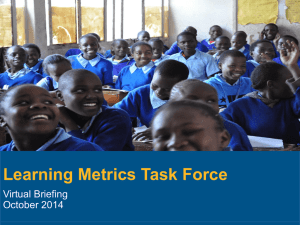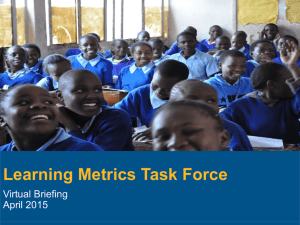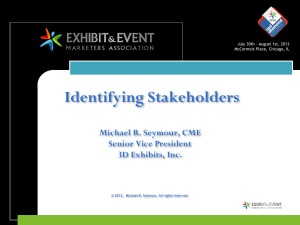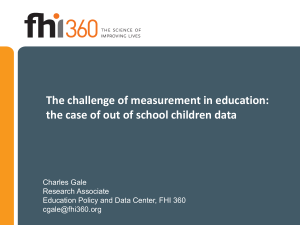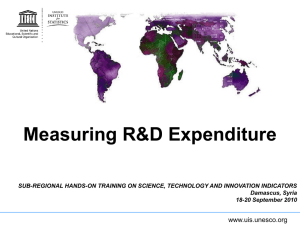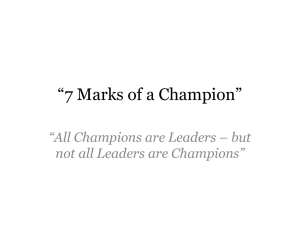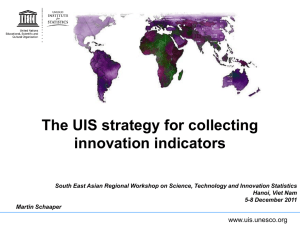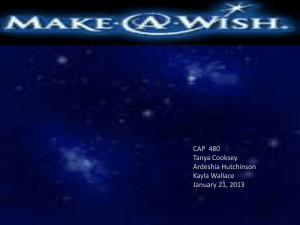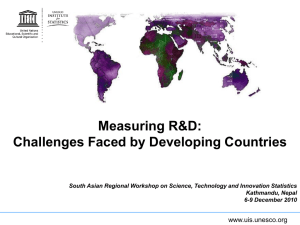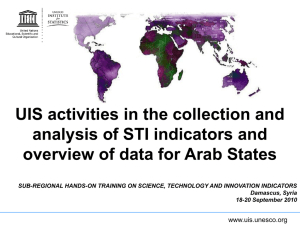Virtual Brief - Brookings Institution
advertisement
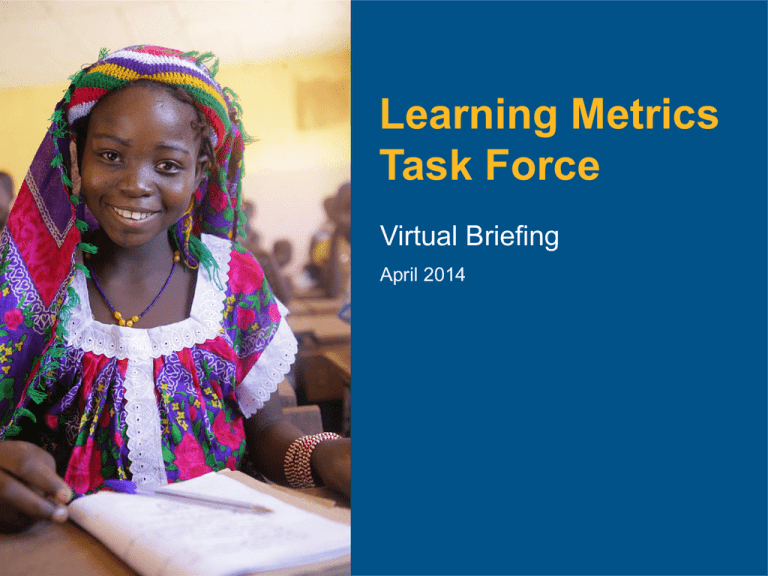
Learning Metrics Task Force Virtual Briefing April 2014 About LMTF 1.0 Ultimate Goal: Improved student learning around the world Focus: Improve measurement of learning and use of data Objectives: • Catalyzing a shift in the global education conversation from access to access plus learning. • Building consensus on global learning indicators and actions to improve the measurement of learning in all countries. Convening Bodies: Center for Universal Education at the Brookings Institution; UNESCO Institute of Statistics Transition to LMTF 2.0 • Second Phase: 2 years (through end 2015) • Reorientation: How can improved assessment systems at the national/local level help improve learning outcomes? • New Working Model: less task force, more network • Expanding Partnership: new partners welcome as Learning Champions Building Consensus on Measuring Learning Taking Action to Improve Learning LMTF 2.0 LMTF 1.0 Long-Term Goal: Access + Learning for All Seven Domains of Learning Seven Areas for Global Tracking + 1. LearningEquity for All 2. 3. 4. 5. 6. 7. Sustain Momentum, Take Action Develop Indicators for Global Tracking Assessment as a Public Good Support at Least 10 Learning Champions Age Matters for Learning Reading Numeracy Ready to Learn Citizen of the World Breadth of Learning Support for Countries Public Good Knowledge Sharing Post-2015 LMTF 2.0 – Five Key Results 1. Technical: Seven areas of indicators for global tracking developed, with cross-cutting focus on equity 2. Institutional: Support at least 10 countries in adapting LMTF recommendations to improve assessment systems and use of assessment data to improve learning 3. Political: Inform the post-2015 education and development agendas 4. Assessment as a Public Good: Develop a strategy for advancing an agenda in which learning data is supported as a global public good 5. Knowledge Sharing: Actors and experts in learning assessment share knowledge and coordinate efforts virtually and in person. Technical Update Areas of Measurement Lead Organizations World Bank, UIS UIS, World Bank, ACER, GPE, DfiD, IEA, LLECE, UNICEF, PASEC, SACMEQ, Boston College (TIMSS & PIRLS Study), University of Texas at Austin, CUE, Save the Children, KICE, RTI, USAID, ASER India and Uwezo UNESCO, UNICEF, World Bank, CUE UNESCO, UNICEF, World Bank, CUE, WHO, GPE, plus a technical advisory group (membership TBD) UNESCO, GEFI Youth Advisory Group, CUE 3 co-chairs working group: Ahmad Alhendawi, UNSG Envoy on Youth (Jordan); Kartikeya Sarabhai, Centre for Environmental Education (India); Eom Jeongmin, Asia and Pacific Centre of Education for International Understanding under the auspices of UNESCO (APCEIU). Reading Ready to Learn Citizen of the World Partners Involved 80 applicants for working group members to date Numeracy KICE, GIZ, UIS GIZ, KICE, ACER, ASER India, Uwezo, IEA, RTI, GPE, UNICEF UIS, Save the Children, Durham University, DfiD Breadth of Learning Opportunities CUE, UIS, TBD Seamus Haggerty/CUE TBD Equity World Bank, UNICEF, Camfed, UIS TBD Learning for All / World Bank, UIS TBD Age and Education Country Support Update • Discussion on focus, purpose, and implementation • Consensus: - Focus heavily on how use better assessment data to improve learning - Build on range of existing efforts - Countries/cities invited to join a group of likeminded Learning Champions to work together on assessment and improving learning • Process of identifying Learning Champions is underway (letters of interest due May 15th) Learning Champions Countries, states, districts, and cities are invited as Learning Champions to engage in the following activities over the 2-year period: • Mapping: Map the learning assessment landscape and the ways that assessment data are or are not being used to help improve learning outcomes. • Defining: Define what is needed to improve learning assessments and the use of assessment data to improve student outcomes, including a clear appraisal of various assessment options (e.g. the relative merits and costs of using different assessment schemes). • Planning: Develop a plan to address the identified needs, working closely with the wide range of partners on the ground, including teachers, civil society, donors, etc. Envision several outputs/guides coming out of the working group. • Sharing: Champions will share their experiences regularly and provide feedback on the process, including possible piloting of global indicator instruments. Assessment as a Public Good Discussion to date includes: • Open Source. Making tools and data, especially for the indicators for global tracking, freely available (note: ECD indicator group has agreed to do this, discussion on-going). • Capacity building. New efforts to help countries use tools and data in their systems. • Platform. Idea of one place (online) to access and share resources. Post-2015 Update Ongoing negotiations within the UN and contributions to deliberations (e.g., Open Working Group, Sustainable Development Solutions Network), leading up to September 2014 draft agenda from UNSG and negotiations beyond). In education: • UNESCO, UNICEF taking lead • EFA Steering Committee process • UIS leading Technical Advisory Group on post-2015 indicators Knowledge Sharing Purpose: Connect actors and experts in learning and assessment to share knowledge and coordinate efforts. Mechanisms: • Map and report on partner activity (Please submit your updates!) • New website (in development) • Virtual and in-person meetings Key Activities and Dates • Global Citizenship Working Group – Submit applications asap please • Activity mapping – Please submit your updates by May 2nd if you haven’t already. These will inform quarterly updates and website content. • Call for Learning Champions – Letters of Interest due May 15th. Complete review and selection by June 15. • In-person meeting in Brussels – June 23 to 24 • GPE replenishment side meetings – June 25 and 26 In-Person Meeting in June Dates: June 23 - 24 Length: 1.5 days Location: Brussels, Belgium (venue TBD) Purpose: • Share in-depth on the work completed to date • Where needed, get input and ideas on ways forward for work streams just starting Proposed Agenda: • Technical updates on indicators • Presentations from Partners on progress toward key results • Presentation of selected Learning Champions and coordination/ discussion of next steps for each • Presentation/discussion on using assessment results to improve learning • Post-2015 updates • Revisit multistakeholder partnership • Plan for December 2014 LMTF symposium • Launch online platform Key Questions • Any feedback on the purpose and proposed agenda for the Brussels meeting? • Distribute call for additional partners? • Revisit what becomes of LMTF at the end of 2 years (embedding, etc.)? • Other? THANK YOU! Visit LMTF on the web: www.brookings.edu/LearningMetrics To join the mailing list, email: LearningMetrics@brookings.edu
